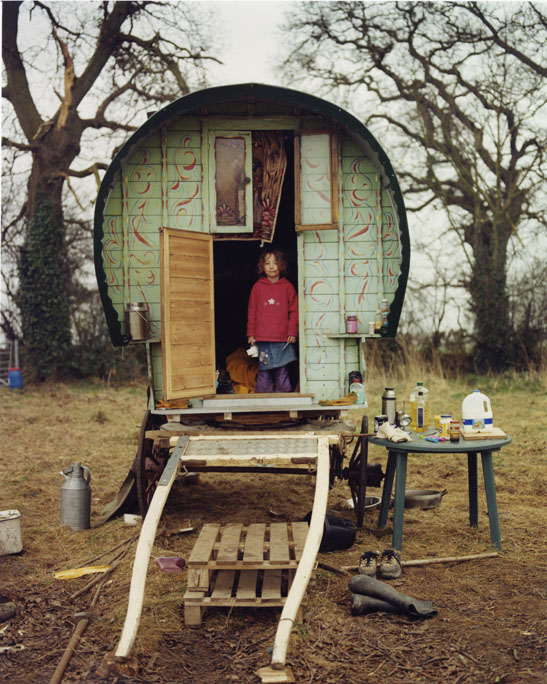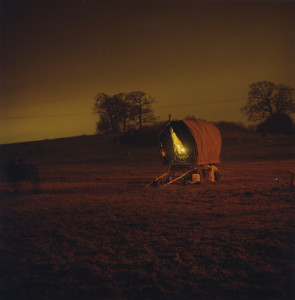A recent book released by British photographer Iain McKell looks at the life of what some in society call the new age gypsies. McKell has  followed a small group of these travelers for over 10 years and has recently released a new photo book on the evolution of their lifestyle. He represents the progression of this group through beautiful images of people who have chosen to live a tiny life on wheels. He tracks the movement from petrol based, motorized vehicle travel to the now more common horse-drawn wagons that this particular group uses.
followed a small group of these travelers for over 10 years and has recently released a new photo book on the evolution of their lifestyle. He represents the progression of this group through beautiful images of people who have chosen to live a tiny life on wheels. He tracks the movement from petrol based, motorized vehicle travel to the now more common horse-drawn wagons that this particular group uses.
 Although they’ve turned to a more traditional mode of travel still found throughout Europe in the lifestyle of the Romani, McKell reflects that this does not mean complete isolation from society. He makes note in an interview he did with anothermag.com that these folks are using modern technology, including solar panels, laptops and social media, to stay connected to the world while they live travelers lives in wagons. His pictures are stunning and this foray into a subculture having nothing to do with the Romani culture is fascinating to me but I feel divided on the matter.
Although they’ve turned to a more traditional mode of travel still found throughout Europe in the lifestyle of the Romani, McKell reflects that this does not mean complete isolation from society. He makes note in an interview he did with anothermag.com that these folks are using modern technology, including solar panels, laptops and social media, to stay connected to the world while they live travelers lives in wagons. His pictures are stunning and this foray into a subculture having nothing to do with the Romani culture is fascinating to me but I feel divided on the matter.
 It begs me to questions how the Romani might feel about westerners appropriating their lifestyle and how this impacts the view society has of their culture. As a ethnic group that has been, and continues to be, persecuted how does a community of western “new agers” impact the ideas and stigmas people have around this type of lifestyle. This western group of travelers is made up of the young, old, families, individuals, poor and rich alike so it’s not just one section of society being represented and while I love this tiny lifestyle and their anti-petrol approach, I have to wonder at the cultural appropriation that may be occurring in their choice of lifestyle.
It begs me to questions how the Romani might feel about westerners appropriating their lifestyle and how this impacts the view society has of their culture. As a ethnic group that has been, and continues to be, persecuted how does a community of western “new agers” impact the ideas and stigmas people have around this type of lifestyle. This western group of travelers is made up of the young, old, families, individuals, poor and rich alike so it’s not just one section of society being represented and while I love this tiny lifestyle and their anti-petrol approach, I have to wonder at the cultural appropriation that may be occurring in their choice of lifestyle.
Does this hold a negative connotation or not? Is it assimilation or appropriation? I’ll put away my contemplative hat for a minute but I think it’s worthwhile to ponder and if you are looking for more vardo inspiration check out Ryan’s post on this awesome wagon built by an archeologist!
Your Turn!
- Do you itch for a gypsy lifestyle?
- Would you pull your vardo by horse or by vehicle?
(SIGH) This blog always makes me feel so OLD when I see a “new movement” that’s been around at least forty years. I doubt if the Romani are losing sleep over people who want to indulge in a housing style that has been around forever. I would suspect they might comment “Idiot!”, as the Native Americans did forty years ago when crowds of white kids decided American Indians were cool, or now, when seventy year old bikers watch youngsters wearing all the gear but without the experiences. Living in a vardo, or wearing buckskin and beads, or garbing yourself in black leather and frowning a lot have nothing to do with the reality of the lifestyle. The Real Ones know this. In my day, the Native Americans were pretty tolerant, and most refused to take advantage of the Naïve-not-Native kids who requested to attend secret ceremonies or buy “blessed sacred spears.” In a way, it was flattering that these kids who were seeking “the right way” and an identity, chose to emulate the NAs. Hence, the tolerance and patience. Crossing the line tends to be when you stop pretending you are interested and seeking, and claim to be One: Cherokee, Romani or Outlaw. Any other oldsters out there familiar with this trend?
Oh, Hell yes.
–The little birds flapping madly on the edge of the nest, about to take their initial flight, and trying out their wings.
–“Imitation is the sincerest form of flattery(?)”
…at least they’re being ProActive, instead of ReActive; at least
their faces and attention are turned toward a better way.
I do itch for a Gypsy Lifestyle. The idea of moving from community to community, not being tied down to a specific place, performing work that I enjoy, not burdened by unnecessary possessions, teaching my children the important stuff really appeals to me. I do a lot of camping already and I love cooking out of doors. Since I have never taken care of Horses or other beasts of burden, I would be much more likely to pull it around with a motorized vehicle.
I think Sally got it on the nose: the line gets crossed when you go from emulating a culture (or what you naively think a culture is) to claiming to be an expert/member without actually assimilating into the original culture*. (Joining a group of OTHER fanboys/girls does not count.)
Some may disagree, but I see nothing wrong with emulating a lifestyle you admire, even if you do so incompletely; in fact, if the original holders believe that lifestyle is worth living, then they should be glad that some others care.
On the other hand, I can see frustration when an important tradition gets shortened to a soundbite, and a vague handwave in the direction of your culture is mistaken for a complete view.
That’s true of anything, though. I’ve seen astronomy folks cringe when they hear laymen discuss black holes, and bakers lament people who mistake making a cake from a box for making one “from scratch.” It’s all the same mistake…just writ large or small.
You know, while I am sure the Romani people lose no sleep over people travelling around in vans and things, it seems a little offensive to use the term Gypsy like it’s a harmless descriptive noun. I can’t help but see some strong cultural appropriation within the approach of this book. It seems wrong to romanticise a lifestyle and ignore the centuries of abuse and oppression of a huge group. Finally, “Gypsy” is considered an offensive term by many many people.
Taking a second look at the article, I see you’ve basically raised all the issues I just put down. So yeah I just wanna capitalise on “Gypsy” = slur
The word “Gypsy” itself is not offensive, unless we give it such our meaning and interpretation.
Osho (an Indian spiritual master) said: “Gypsy means a vagabond. Do you know that Gypsies originally belonged to India? They are Indians but they reached Europe through Egypt, hence the name Gypsy, from ‘Egypt’. They were coming from Egypt so they started being called ‘Gypsy’ but their original land is India.
The language they speak is almost fifty percent Hindu. They don’t call themselves Gypsies; they call themselves ‘Roma’. It comes from the Indian word ‘Rama’. Roma means the people of Rama. They are beautiful people. They have never settled and that is their beauty.” (Osho: Nansen the point of departure , ch 08)
“`Gypsies’ in India is a beautiful word: it is khanabados. Its meaning is a man who carries his home on his own shoulders. Khana means `home,’ bados means `on the shoulders.’
We are carrying our home on our own shoulders, but we are searching unnecessarily for it here and there, running… not looking in the moment where we are.” (Osho)
Respect for Romani’s, there culture, lifestyle, and the oppression and persecution they have endured coupled with an appreciation of living simply, understanding the importance of nature and family could and should be any travelers mode. That being said appropriating the term gypsy prefaced with new age is rather appropriate. Most individuals are dismissive of new age anything and attached to gypsy, gypsy is clearly romanticized. The terms coined rather succinctly explains the movement. They are appropriating an idea of a culture which has been romanticized and emulating a lifestyle while evolving into their own individual movement. Personally I almost wish it were possible to actually assimilate into the original culture, and yet to keep contact with the outside world, however this would be a contradictory notion and would completely change the original culture. For those of us whom see merit in a traveler life style emulation is the closest plausible notion.
Hiya Andrea, as you know I love wandering. I would love to do so with more than what I could carry on my back, but there is a stronger pull currently for me to establish a solid home base. The full on gypsy lifestyle doesn’t call me, but people I have told of my travels have characterized me as gypsy-like. I didn’t protest, perhaps in part because of fetishized notions of gypsies. I am never in doubt that my privilege is constantly infecting me in ways I don’t recognize. Thanks for pointing this out as a possible form of cultural appropriation, and giving me the food for thought.
There’s “cultural appropriation” and then there’s drawing on a limited or particular pool of options to solve practical problems or draw aesthetic inspiration. Just because you come up with similar solutions doesn’t mean you have ulterior motives. Most cultures borrow from others and it’s often smarter to adapt something rather than re-invent it. That’s partly why we don’t all live in calcified cultures where you are only allowed to do what your ancestors did. Don’t claim to be something you’re not but do be respectful and acknowledge the source.
Hi, Regarding the article Study of New Age Gypsy Culture
I dont think its cultural appropriation to live in mobile tiny houses like the Rom do. It’s not greedy and vindictive stealing of their ideas for money making schemes, such as new agey people charging hundreds of dollars for weekend “Native American” ceremonials etc. I think Its a compliment to their ingenious ways of making houses! All the Best Elaine
I don’t imagine the Roma give a hoot about silly cultural appropriation.The caricature approach is amusing though.
I think what they’re doing is fine if they really have respect for the true Romani Gypsies. I myself would be very happy to live in one of those vardos on a bit of land along with other vardos. I wouldn’t want to travel as much because I’m an agricultural person and I’d like to stay near the same garden and orchard most of the year. So, going on a handful trips, but spending most of my time at the same farm would be my ideal.
I personally love the aesthetic of the authentic vardos and of the people in traditional gypsie attire. I’m also a horseman, so spending my days in contact with horses is the life for me, and that’s another aspect of the old traditional ways that appeals to me. I must admit that I don’t know where or how I’d travel on a road while driving horses though. The automobile drivers in my area are more numerous and selfish every 6 months.
I have been called a gypsy my whole life, as soon as people learned i was Romanian. I have been asked where my wagon was or people around me were told to watch their wallets. Its very insulting, and i feel anxious and upset when i see a gypsy halloween costume or see fake fortune tellers at fairs and such. Same for when people say they feel like gypsies for one reason or another. Please be aware that this sort of thing upsets people who are Romanian. I have no idea if any of my ancestors are Roma and frankly dont want to know.